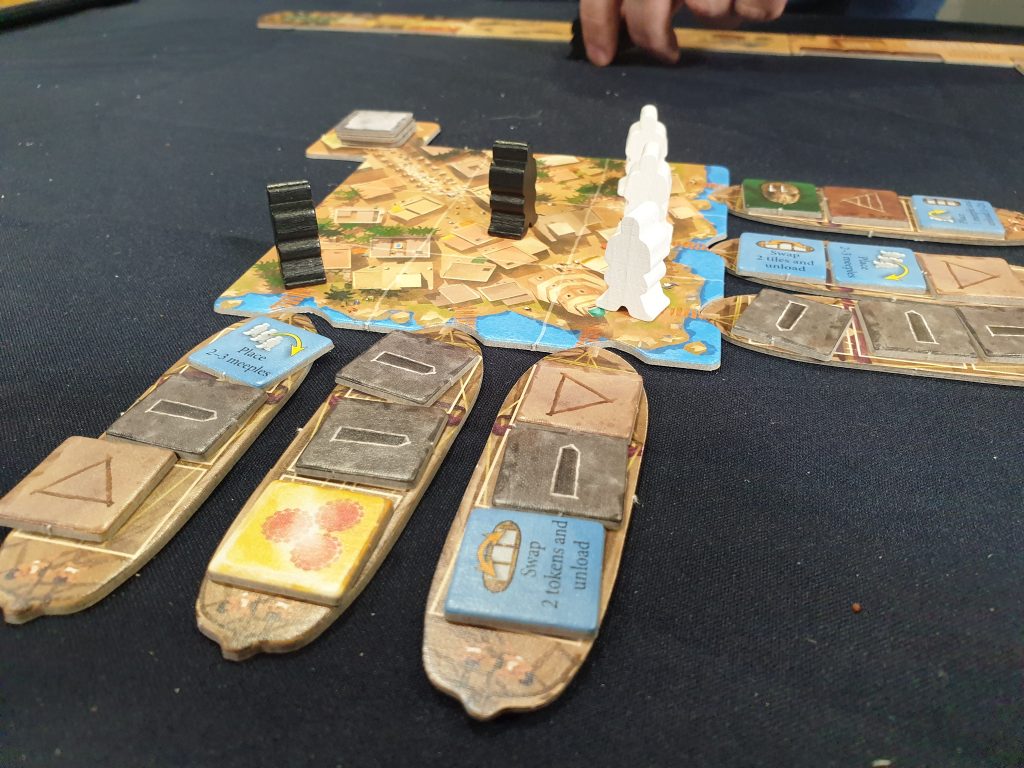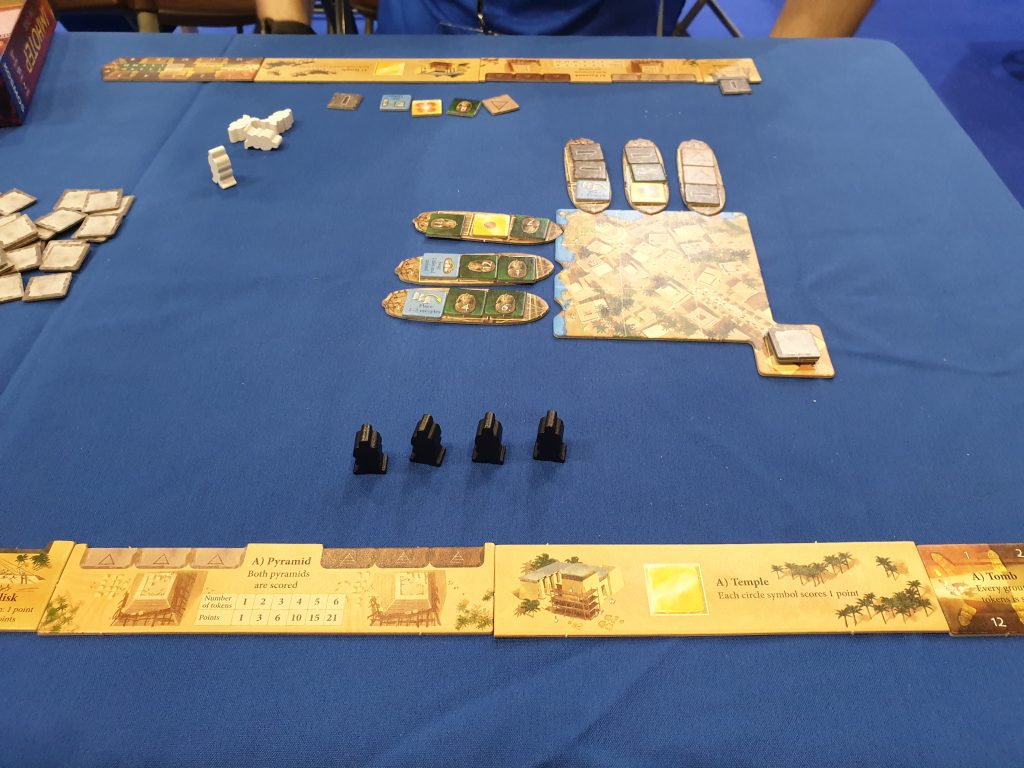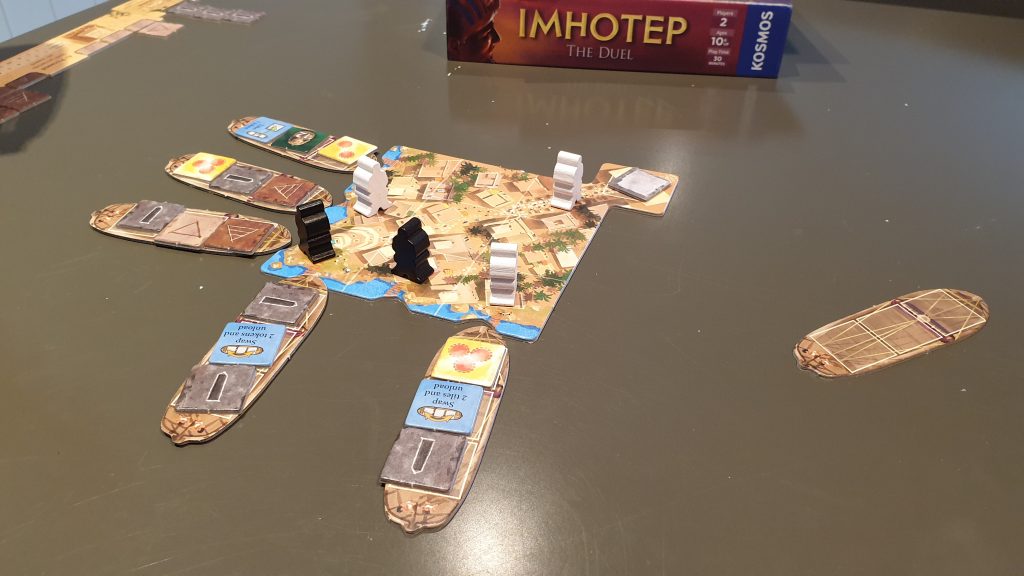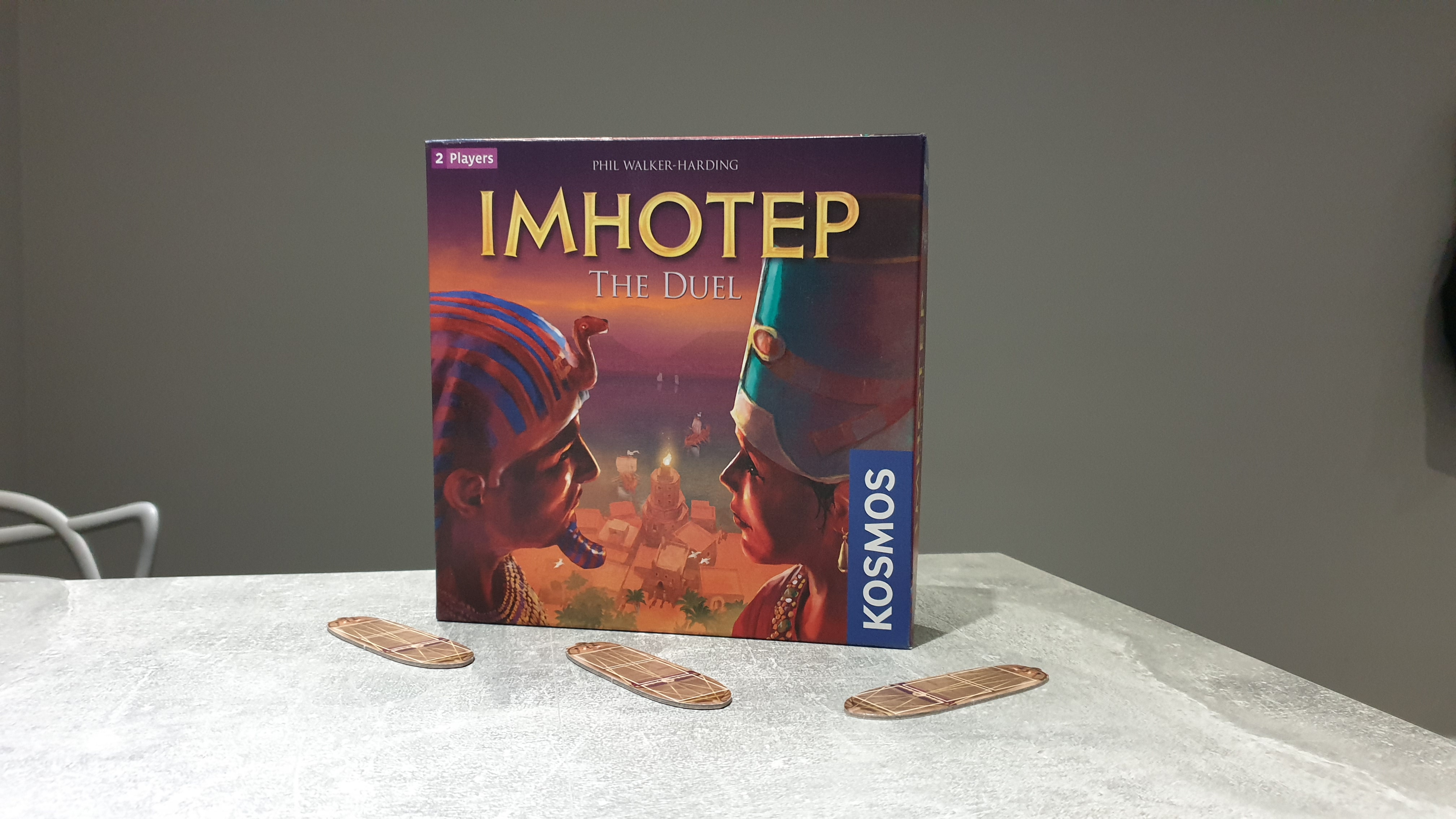Imhotep The Duel is the brand new 2 player version of designer Phil Walker-Harding’s 2016 title Imhotep. Published by Kosmos, this sees two players go head to head as Nefertiti and Akhenaten. The royal couple get their workers to unload boats of tiles, build monuments and more. Lasting around 30 minutes, does the game capture the Egyptian theme like the original? Let’s find out!
Players will once again see barges full of goods however this time however they are pre-filled with tokens. Setting up a central board featuring a 3×3 grid is placed with 6 barges placed along two sides – one per row/column. All of the tokens are shuffled with a facedown pile formed next to the board. Three are removed and placed on a slot on the central board, before the 3 slots on each barge are filled from the pile. Choosing one of the two colours players take their four meeples and take the 4 personal board sections. These have two sides (A & B) with players needing to match. Whilst the boards match the A & B sides score the four sections differently.
On a turn players have a choice between up to 3 options: place a meeple, unload a barge or a special action. When a player has at least one meeple left they can place one onto an empty space on the central 3×3 grid. Positioning matters as whenever a row or column has at least 2 workers the associated barge can be unloaded as an action. Moving to the back of the barge in order the meeples are in, what tokens they end up standing on are passed to their owners. These tokens come in many types from Obelisks that can score per part and majority or whomever gets to five height first, through pyramid building to jewels collected and sets of continuous tomb based sarcophaguses.

Some tokens, which are blue in colour, are worth a single point if kept but offer a special action to player. These are powerful, such as being able to place up to three meeples on a turn or unloading two barges. Any unclaimed tokens on an unloaded barge are thrown into the sea – or back into the box. If there are tokens left in the pile they refill the barge instantly otherwise it sails away. When all bar one barge have sailed the game ends. Players score for blue special action tokens, meeples left on the central board and the four sections of their board – based upon collected tokens. Whomever has the most points is crowned the winner.
In a 3+ player game if a player is focusing on one route to score big there are two players to block them. This isn’t the case in the 2 player only Imhotep The Duel. Players are therefore forced to either focus on something different and score big or block and cause neither player to score well. This leads to a more cutthroat game than the original Imhotep, which had a few occasions of screwing others over with barges sailing. It is just a slight shame it is at times a very black and white decision between personal gain and stopping an opponent.
A couple of events being triggered from one board element to the next – similar to how many roll and write titles work – could have seen personal progression and blocking possible. This is somewhat seen in the blue action tiles, with the ability to swap the order of tokens or take tokens from a barge but do take up an entire turn. It would have been nice to see some elements combo together to make individual turns feel epic even when not using a special action.

Often with games that have a pile of resources and multiple spaces to put them on there can be a lot of game admin to contend with. Thankfully in Imhotep The Duel this is minimised as commonly only one barge each turn is emptied – so you won’t find yourself having to refill a whole host of spaces. This is great for keeping the flow of the game. It results in a board that can somewhat change between turns, so there is a need to tactically react, but the ability to plan ahead isn’t lost.
Players will constantly be having to balance placement across the rows and columns. Otherwise your opponent can simply force you to take something almost useless by unloading a ship from a different direction. Nothing is bad in the game, at worst any token is worth a point, so there isn’t the ability to massively screw an opponent with negatives. Still there are some things that are much better to claim than others – especially when you have sets of tiles already collected. This is a nice middle ground between being completely cutthroat, as you purposely get in the way of what an opponent wants, with being minutely forgiving. A new player is still unlikely to win but they won’t constantly feel they are being crushed in defeat – with scores rarely too dissimilar.
Production wise Imhotep The Duel is decent though not overly inspiring. The cardboard chits for the resource tokens are of decent size – so aren’t fiddly. The central board and personal board parts are solidly made and the meeples aren’t standard meeple shape which adds a little flair. One of the fun elements of the original was sailing a barge by pushing it across the table. While in this game the barges aren’t connected to the board they do just sit there for 99% of the game, simple being refilled. Not only is a bit of a shame, it is one of the first things you’ll do when unloading a barge before realising it is more pointless than before.

While it might take new players a game to get to grips with the strategies behind meeple placement the options are simple. This allows what is a slightly thinky title to be accessible. The way everything is positive point wise goes hand in hand with this to make it a welcoming experience, before the gloves come off and the cutthroatness begins. Aside from the special actions, which add a much needed variety into the actions taken, players can rarely blame their opponent as their own meeple placement will have given an opportunity. For the ease of play and options to choose between Imhotep The Duel has proved itself to be a solid 2 player title, and one I’d happily get off the shelf for the player count over the original.
[Editor’s note: Imhotep The Duel was provided to us by the publisher at UKGE 2019 for the review.]

